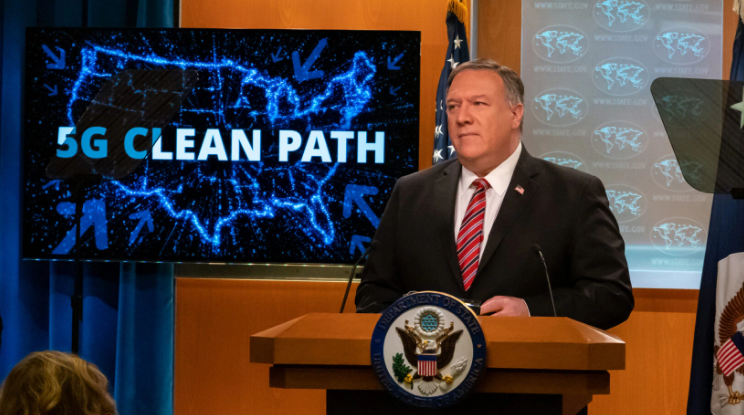
U.S. Secretary of State Mike Pompeo speaks during a news conference at the State Department, Washington, D.C., U.S., April 29, 2020. /AP
U.S. Secretary of State Mike Pompeo speaks during a news conference at the State Department, Washington, D.C., U.S., April 29, 2020. /AP
Editor's note: Tom Fowdy is a British political and international relations analyst and a graduate of Durham and Oxford universities. He writes on topics pertaining to China, the DPRK, Britain and the U.S. The article reflects the author's opinions, and not necessarily the views of CGTN.
This week Denmark's Public Broadcaster, the DR, published a series of revelations that the United States National Security Agency (NSA) coordinated with the country's intelligence services to spy on Denmark's government itself, including their financial and foreign ministries, as well as a number of European defence firms, in order to obtain information on the country's fighter acquisition program and subsequently gain an advantage in selling the country Lockheed Martin F-35s instead of them purchasing Eurofighters.
The report states that the U.S. was able to tap into the country's telecommunications networks via fiber optic cables to do so.
This is a staggering irony and mammoth scale hypocrisy from the country who preaches to others "the clean network" fears of espionage and reveals in tandem, what the American scheme to exclude Huawei is in fact really all about: the uncontested supremacy of U.S. global surveillance programs which are subsequently used to promote the interests of the military-industrial complex.
This is not a new or standalone revelation, but part of a longstanding trend by Washington which has persistently utilized such activities for commercial gain and intellectual property theft.
The anti-Huawei campaign is thus little more than a deflection for what the U.S. itself does, and they didn't need 5G to do so.

A screenshot of the DR report.
A screenshot of the DR report.
Over the past two years, the U.S. has waged a phenomenally aggressive campaign to oust Huawei from the next generation telecommunications networks of western countries. In doing so, it has been claimed that the Chinese company has ties to the government which subsequently allow those networks to be used for espionage.
Despite the fact that evidence of these allegations is scant, and has never been proven beyond "guilt by association" arguments, the Western mainstream media has largely taken this narrative at face value and has seldom scrutinized it.
This has created a false binary assumption that China is the "espionage threat" and the U.S. as an allied country, would never abuse technology for malign purposes.
This week's revelations tell a different story. Here is an out in the open example as to how the United States has abused its intelligence sharing agreements with other countries, in order to undermine that country itself for its commercial gain.
Chief to the benefactors was the military-industrial complex, which might be noted have funded a number of think tanks espousing anti-Huawei propaganda, and the losers?
Europe's own defense industry. This is not the first time U.S. surveillance has done this.
In 1994, the U.S. intelligence sabotaged a $6-billion-deal between European firm Airbus and Saudi Arabia, so that Boeing could win it instead, and in the same year, also undermined the French company Thompson-Alcatel in Brazil so that a $1.3 billion contract could be given to Raytheon. Such agreements have also been used to steal intellectual property from German industry.
This should reveal the superficiality of the anti-Huawei argument. This isn't about security as much as it is about American supremacy and uncontested monopoly, in both the strategic and corporate spheres.
The Denmark story shows how the United States are cooperating with the intelligence agencies of allied countries in order to advance US interests, even acting against that country itself, and to do so requires that they "politically control" or have "access" to the telecommunications networks in a preferential way, with the U.S having also infiltrated encryption firms in the west as the Washington Post revealed in February.
Huawei however, poses a challenge on the political premise that they do not control it, and therefore such equipment is harder to be co-opted for espionage.
In this case, what might be known as "the clean network" is a snake oil sham being espoused by the United States which glosses over the inconvenient reality that the data of Europeans is not safe or private with Washington as a "good ally" as Pompeo misleadingly presents it, but that they are actively utilizing their monopoly over intelligence and pacts with respective countries to undermine European interests on behest of the military-industrial complex.
Huawei is not the threat and it never was, this is why such countries did not in fact take the American arguments seriously until they were coerced into doing so, the United Kingdom being the most obvious example. Rather, it stands in the way of uncontested American monopoly and profit.
Thus there is no "clean network", only American interests and double standards. What it accuses a Chinese firm of groundlessly doing, is in fact a reflection of what itself has been doing all along.
(If you want to contribute and have specific expertise, please contact us at opinions@cgtn.com.)

